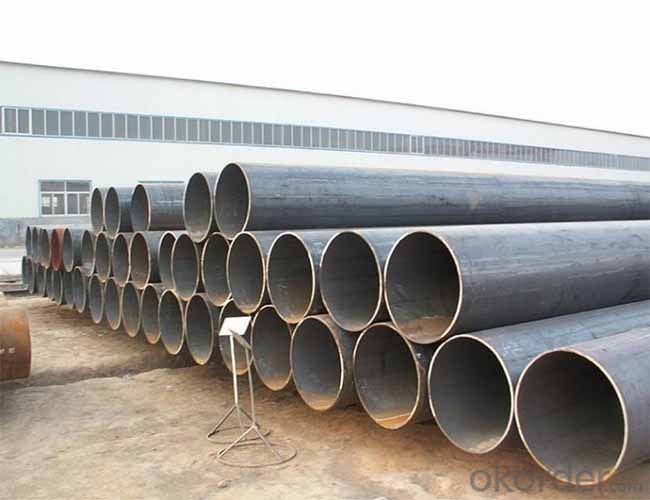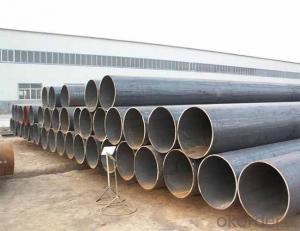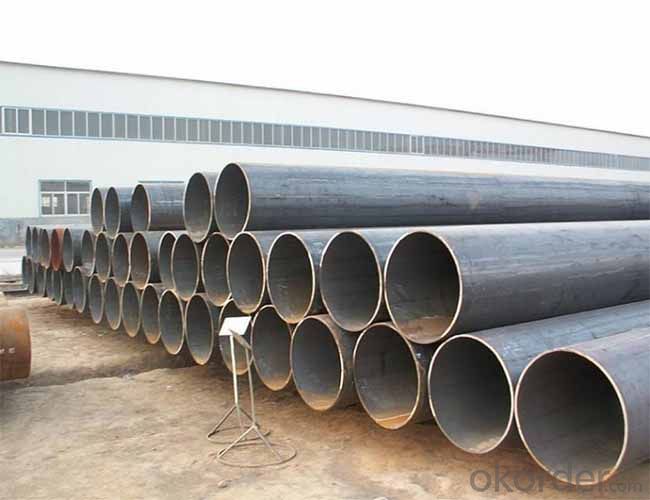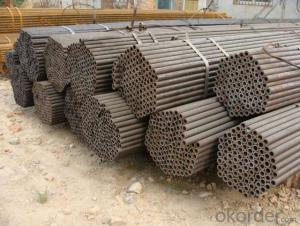Steel Pipe -- Welding Steel Tube Suppliers
- Loading Port:
- Tianjin
- Payment Terms:
- TT OR LC
- Min Order Qty:
- 50 m.t.
- Supply Capability:
- 9000 m.t./month
OKorder Service Pledge
OKorder Financial Service
You Might Also Like
1、Structure of Steel Pipe -- Welding Steel Tube Suppliers
Welded Steel Pipe is to be used for conveying gas, water, and petroleum foroil and natural gas industries. And used for structural steel pies purpose. As the manufacturing process does not include any welding, seamless pipes are perceived to be stronger and more reliable. Historically seamless pipe was regarded as withstanding pressure better than other types, and was often more easily available than welded pipe.
2、Main Features of Steel Pipe -- Welding Steel Tube Suppliers
• High manufacturing accuracy
• High strength
• Small inertia resistance
• Strong heat dissipation ability
• Good visual effect
• Reasonable price
3、Steel Pipe -- Steel Pipe -- Welding Steel Tube Suppliers:
Standard | GB, DIN, ASTM ASTM A106-2006, ASTM A53-2007 |
Grade | 10#-45#, 16Mn 10#, 20#, 45#, 16Mn |
Thickness | 8 - 33 mm |
Section Shape | Round |
Outer Diameter | 133 - 219 mm |
Place of Origin | Shandong, China (Mainland) |
Secondary Or Not | Non-secondary |
Application | Hydraulic Pipe |
Technique | Cold Drawn |
Certification | API |
Surface Treatment | factory state or painted black |
Special Pipe | API Pipe |
Alloy Or Not | Non-alloy |
Length | 5-12M |
Outer Diameter | 21.3-610mm |
Grade | 20#, 45#, Q345, API J55, API K55, API L80, API N80, API P110, A53B |
Standard | ASME, ASTM |
1) Material:20#(ASTM A 106/A53 GRB.API5LGRB,GB),45#,16Mn,10#.
2) Specification range:OD:21.3-610mm,WT:6-70mm,length:6-12m or according to the requirement of clients.
3) Excutive standards:GB,ASME API5L.ASTM A 106/A53,Despite of the above standards,we can also supply seamless steel pipe with standard of DIN,JIS,and so on,and also develop new products according to the requirements of our clients!
4) Surface:black lacquered,varnish coating or galvanized.
5) Ends:Beveled or square cut,plastic capped,painted.
6) Packing:bundles wrapped with strong steel strip,seaworthy packing.
4、Packaging & Delivery
Packaging Details: | seaworthy package,bundles wrapped with strong steel strip |
Delivery Detail: | 15-30days after received 30%TT |
5、FAQ of Steel Pipe -- Welding Steel Tube Suppliers
①How is the quality of your products?
Our products are manufactured strictly according to national and internaional standard, and we take a test
on every pipe before delivered out. If you want see our quality certifications and all kinds of testing report, please just ask us for it.
Guaranteed: If products’ quality don’t accord to discription as we give or the promise before you place order, we promise 100% refund.
②How about price?
Yes, we are factory and be able to give you lowest price below market one, and we have a policy that “ for saving time and absolutely honest business attitude, we quote as lowest as possible for any customer, and discount can be given according to quantity”,if you like bargain and factory price is not low enough as you think, just don’t waste your time.Please trust the quotation we would give you, it is professional one.
③Why should you chose us?
Chose happens because of quality, then price, We can give you both.Additionally, we can also offer professional products inquiry, products knowledge train(for agents), smooth goods delivery, exellent customer solution proposals.Our service formula: good quality+good price+good service=customer’s trust
SGS test is available, customer inspection before shipping is welcome, third party inspection is no problem.
6、Steel Pipe -- Welding Steel Tube Suppliers: Images:

- Q: Can steel pipes be used for stadium construction?
- Yes, steel pipes can be used for stadium construction. Steel pipes offer several advantages that make them suitable for this purpose. Firstly, steel pipes are strong and durable, making them capable of withstanding heavy loads and providing structural stability to large structures like stadiums. They have high tensile strength, which means they can resist bending or breaking under pressure. Additionally, steel pipes are resistant to corrosion, which is crucial for outdoor structures like stadiums that are exposed to various weather conditions. Their resistance to rust and other forms of degradation ensures the longevity of the stadium. Furthermore, steel pipes are versatile and can be easily fabricated into different shapes and sizes, allowing for customized designs and efficient installation. Moreover, steel pipes offer cost-effectiveness in stadium construction. They can be easily produced in large quantities, making them readily available and affordable. The ease of transportation and installation of steel pipes also contributes to their cost-effectiveness. Another advantage of using steel pipes for stadium construction is their sustainability. Steel is a recyclable material, and using steel pipes promotes environmental responsibility. The recyclability of steel reduces the demand for new materials and minimizes waste. In summary, steel pipes can indeed be used for stadium construction due to their strength, durability, resistance to corrosion, versatility, cost-effectiveness, and sustainability.
- Q: Can steel pipes be threaded?
- Yes, steel pipes can be threaded.
- Q: What is the maximum allowable stress for steel pipes?
- The maximum allowable stress for steel pipes depends on various factors such as the grade of steel, diameter, wall thickness, and the intended application. It is typically determined by industry standards and codes, such as the American Society of Mechanical Engineers (ASME) Boiler and Pressure Vessel Code. Therefore, there is no one-size-fits-all answer to this question.
- Q: How are steel tubes represented?
- If it is seamless steel pipe, welded steel pipe, the method of expression is: nominal diameter refers to the outer diameter (diameter * wall thickness). The unit is mm. [for example, seamless steel tubes of phi 32 * 3. It means that the nominal diameter (outside diameter) is seamless steel pipe of phi 32mm and wall thickness 3mm.
- Q: What is the hardness of steel pipes?
- The hardness of steel pipes can vary depending on the specific grade and manufacturing process. Generally, steel pipes are made from alloys that provide a combination of strength and toughness. To determine the hardness of steel pipes, various methods such as Rockwell or Brinell hardness tests can be conducted. These tests measure the resistance of the steel to indentation or penetration by a standardized indenter. The hardness of steel pipes is typically expressed as a numerical value on a scale, such as the Rockwell hardness scale (e.g., HRC or HRB) or the Brinell hardness scale (e.g., HB). The hardness of steel pipes is important as it indicates their ability to withstand physical stresses, such as pressure, impact, or wear, in various applications such as construction, oil and gas transportation, and manufacturing.
- Q: What's the difference between hot dip galvanizing and cold galvanizing? Which kind of galvanizing method is good?
- Cold galvanizing refers to the zinc plating, the coating is thinner, corrosion resistance is slightly worse, variable color. Environmental pollution.Hot dip galvanized by molten zinc ingots, the coating thickness can be adjusted, good corrosion resistance, and subsequent passivation, can be used for outdoor rust, long service life, some up to 20 years.
- Q: What are the common methods for cleaning the inner surface of steel pipes?
- Some common methods for cleaning the inner surface of steel pipes include chemical cleaning, mechanical cleaning, and high-pressure water jetting. Chemical cleaning involves using solvents or acids to dissolve and remove any contaminants or residue. Mechanical cleaning involves using tools such as wire brushes, scrapers, or pigs to physically scrub and scrape the inner surface of the pipes. High-pressure water jetting involves using a pressurized stream of water to blast away dirt, scale, or other deposits. These methods can be used individually or in combination, depending on the specific cleaning requirements and the condition of the pipes.
- Q: What is PE coated steel pipe? Seek explanation
- The appearance of the native HDPE is milky white and is somewhat translucent in the narrow cross section. PE has excellent properties that are resistant to most life and industrial chemicals. Polyethylene (PE) pipe due to its unique advantages and is widely used in building water supply, drainage, underground drainage pipe, building heating, gas pipelines, electrical and telecommunications, industrial protective casing pipes, agricultural pipes etc.. The utility model is mainly used for urban water supply, urban gas supply and farmland irrigation.
- Q: What is the difference between steel pipes and fiberglass-reinforced pipes?
- The main difference between steel pipes and fiberglass-reinforced pipes lies in their composition and structural characteristics. Steel pipes are made of a durable metal alloy, typically carbon steel, which provides strength and resistance to high pressure and temperature. On the other hand, fiberglass-reinforced pipes are composed of a plastic matrix reinforced with glass fibers, making them lightweight, corrosion-resistant, and suitable for various applications. While steel pipes are commonly used in industrial settings, fiberglass-reinforced pipes are often utilized in sectors requiring corrosion resistance, such as chemical processing, wastewater treatment, and oil and gas industries.
- Q: How are steel pipes used in automotive manufacturing?
- Automotive manufacturing extensively employs steel pipes for a multitude of purposes. The exhaust system represents one of the principal functions of steel pipes in this industry. In vehicles, the exhaust system is accountable for securely eliminating harmful gases generated during the combustion process. Steel pipes are employed in fabricating the exhaust manifold, which collects exhaust gases from the engine cylinders and directs them towards the exhaust pipe. Additionally, steel pipes are also utilized in constructing the chassis and frame of vehicles. The chassis offers structural support and aids in upholding the overall strength and stability of the vehicle. Due to their exceptional strength and durability, steel pipes are the optimal choice for manufacturing the chassis and frame. These pipes are frequently welded together to form a rigid and robust structure capable of withstanding diverse forces and impacts. Furthermore, steel pipes find application in the suspension system of automobiles. The suspension system is responsible for delivering a comfortable and smooth ride by absorbing shocks and vibrations. Steel pipes are employed in manufacturing suspension components such as control arms, tie rods, and sway bars. These components contribute to maintaining the stability, handling, and overall performance of the vehicle. Moreover, steel pipes are utilized in the fuel system of automobiles. They are responsible for transporting fuel from the fuel tank to the engine. These pipes necessitate resistance to corrosion and possess high tensile strength to guarantee the safe and efficient delivery of fuel. In conclusion, steel pipes play a pivotal role in automotive manufacturing. They are utilized in diverse applications including the exhaust system, chassis and frame construction, suspension system, and fuel system. The incorporation of steel pipes in these areas ensures the durability, strength, and performance of vehicles while simultaneously upholding safety and efficiency.
Send your message to us
Steel Pipe -- Welding Steel Tube Suppliers
- Loading Port:
- Tianjin
- Payment Terms:
- TT OR LC
- Min Order Qty:
- 50 m.t.
- Supply Capability:
- 9000 m.t./month
OKorder Service Pledge
OKorder Financial Service
Similar products
Hot products
Hot Searches
Related keywords


























